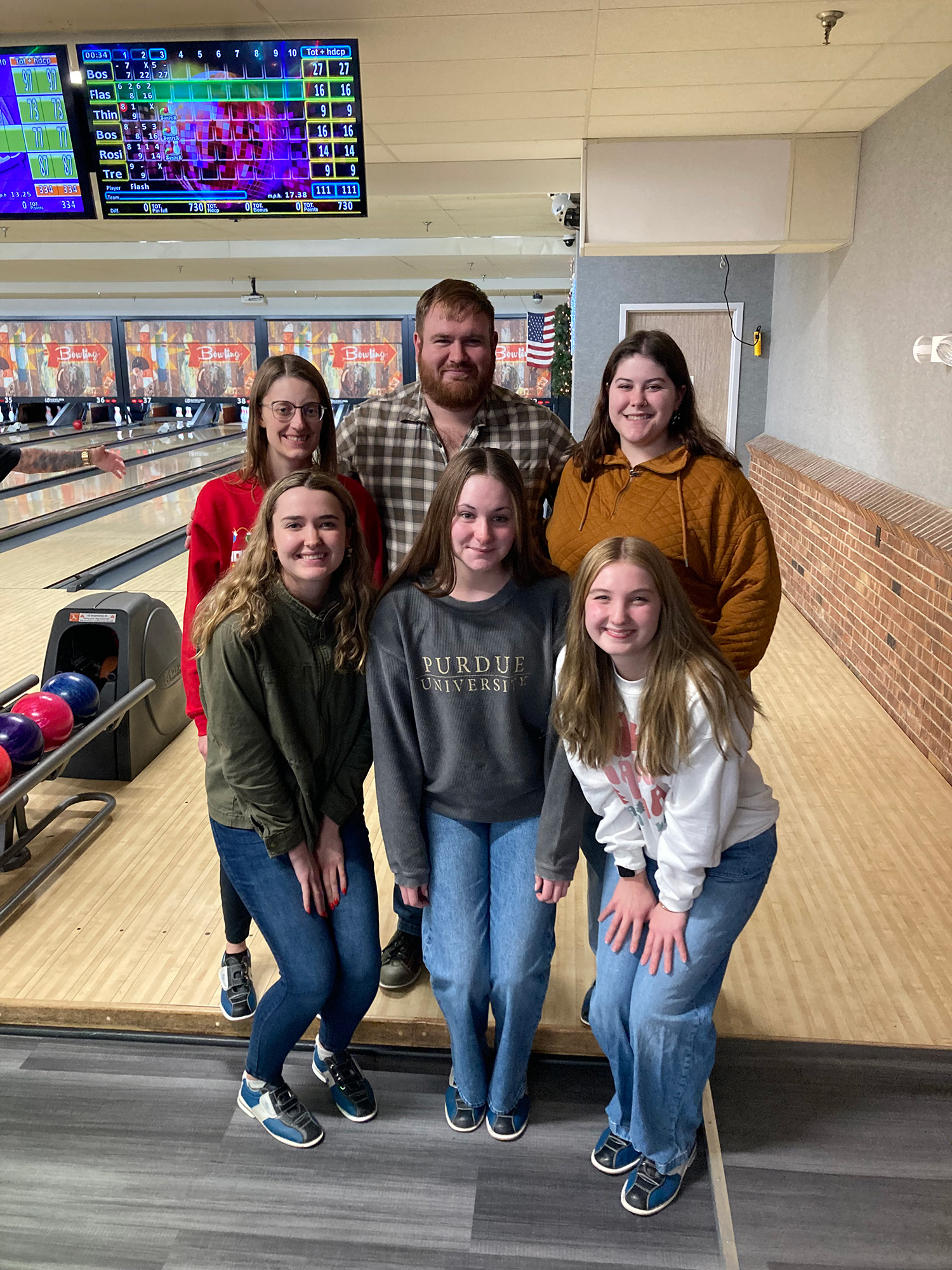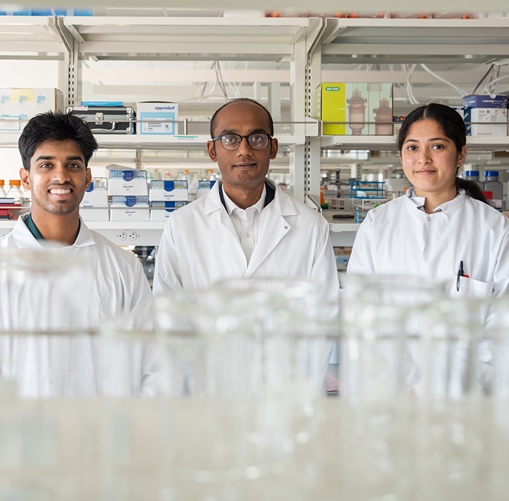Student involvement opportunities in animal behavior and welfare
In the Purdue Department of Animal Sciences, students interested in animal behavior and welfare have a multitude of hands-on opportunities to explore their interests. Seventy undergraduates are currently enrolled in the behavior and well-being concentration within the department, alongside many graduate students conducting research in the discipline. Whether it’s through coursework, undergraduate and graduate research, student organizations or national competitions, Purdue Animal Sciences provides a rich, collaborative environment to support students at every level.
Courses Offerings
Students begin their journey in animal behavior and welfare through foundational coursework, including:
- ANSC 303: Animal Behavior (taught by Heather Neave)
- ANSC 404: Animal Welfare (taught by Marisa Erasmus)
- ANSC 505: Advanced Animal Welfare Assessment (taught by Erasmus)
These courses provide students with a scientific understanding of animal behavior, the principles of welfare assessment and real-world applications of welfare practices across species.
Hands-On Research with Faculty Mentors
Undergraduates and graduate students benefit from faculty-led research projects focused on improving animal welfare.
For example, upcoming sophomore in animal sciences Anna Heck began working with Neave’s lab in the 2024-2025 school year.
“This past spring, I helped with maternal studies, observing cow-calf behavior and coding those interactions,” Heck said. “We are trying see if prolonged cow-calf contact is beneficial for both animals.”
Graduate students lead their own research projects with mentorship from the department’s faculty members. Levi Byrd, a master’s student in Neave’s lab, focuses on maternal behavior in dairy cattle.
“Welfare is important for all animals, but I especially enjoy studying it through the lens of dairy cows. We rely on these animals for the nutritional value of their milk across the world, but especially here in the U.S.,” Byrd said. “We want them to be as well adapted to their environment as possible, not only for production, but also because in many cases, they’re housed in confined operations. That means every element of their experience relies on us, and that’s no small undertaking.” Members of Heather Neave’s lab are pictured here, including Levi Byrd, Mattie DeHaven and Neave in the back row, with undergraduate students Emma Hartley, Erin Bollinger and Anna Heck in the front row. (Photo provided by Levi Byrd)
Members of Heather Neave’s lab are pictured here, including Levi Byrd, Mattie DeHaven and Neave in the back row, with undergraduate students Emma Hartley, Erin Bollinger and Anna Heck in the front row. (Photo provided by Levi Byrd) Harliqueen Jacinto, another master’s student in the department, studies poultry welfare, specifically how cold stress impacts laying hens. She is in Erasmus’ lab.
“My current research focuses on the behavior and welfare of laying hens under cold stress conditions,” Jacinto explained. “We’re testing management strategies that support their welfare and behavior during winter, such as providing warmed perches to help alleviate cold stress while allowing them to display their natural behavior of roosting on a perch.” Harliqueen Jacinto, a master’s student in the Department of Animal Sciences, conducts research on laying hen behavior and welfare under cold stress conditions. (Photo provided by Harliqueen Jacinto)
Harliqueen Jacinto, a master’s student in the Department of Animal Sciences, conducts research on laying hen behavior and welfare under cold stress conditions. (Photo provided by Harliqueen Jacinto) Undergraduate student Jenna Boewe also contributes to Erasmus’ lab.
“I learned a lot about how to run a research project, how to manage a group of people, and how to work with live animals,” Boewe said. “It gave me a much better understanding of the research process and what goes into improving animal welfare through science.”
 Jenna Boewe, an undergraduate student in animal sciences, attended the 2024 International Production & Processing Expo. (Photo provided by Jenna Boewe)
Jenna Boewe, an undergraduate student in animal sciences, attended the 2024 International Production & Processing Expo. (Photo provided by Jenna Boewe) In addition to research, students also have the opportunity to travel to conferences and events focused on animal behavior and welfare. These experiences allow students to present their work, network with professionals, and stay current on advancements in the field. Click here for more information on upcoming conferences and events.
Animal Welfare Judging Team
The Purdue Animal Welfare Judging Team, open to both undergraduate and graduate students, is another strong opportunity for those interested in applying their classroom knowledge in real-world scenarios. As part of ANSC 505: Advanced Animal Welfare Assessment, students compete in the American Veterinary Medical Association’s Intercollegiate Animal Welfare Judging and Assessment Contest.
 Students Hayley Sutherland, Elizabeth Schafer, Levi Byrd, Madison Pinkerton, Jenna Boewe, Teresa Carlson and Lexi Smith prepare to judge the live scenario at the University of Wisconsin–River Falls in November 2024. (Photo provided by Marisa Erasmus)
Students Hayley Sutherland, Elizabeth Schafer, Levi Byrd, Madison Pinkerton, Jenna Boewe, Teresa Carlson and Lexi Smith prepare to judge the live scenario at the University of Wisconsin–River Falls in November 2024. (Photo provided by Marisa Erasmus) At the 2024 Fall AVMA Animal Welfare Assessment Contest, held November 22–24 at the University of Wisconsin–River Falls, Purdue teams earned top honors:
- The undergraduate Team Purdue (Jenna Boewe, Teresa Carlson, Lexi Smith) placed 3rd.
- Graduate Team Black & Gold (Levi Byrd, Maddie Pinkerton, Elizabeth Schafer, Hayley Sutherland) placed 2nd.
- Graduate Team Boilermaker Special (Gideon Ajibola, Mattie DeHaven, Nathan Griffith, Zimbabwe Osorio Santos, Isabella von Seggern) placed 4th.
 Purdue Animal Sciences students earned top honors at the 2024 AVMA Animal Welfare Assessment Contest, held Nov. 22–24 at the University of Wisconsin–River Falls. (Photo provided by Marisa Erasmus)
Purdue Animal Sciences students earned top honors at the 2024 AVMA Animal Welfare Assessment Contest, held Nov. 22–24 at the University of Wisconsin–River Falls. (Photo provided by Marisa Erasmus) In addition to team success, Hayley Sutherland placed 2nd individually in the graduate division.
“The competition really pushes you to think on your feet and back up your decisions with science,” Sutherland said. “It’s a great way to build your confidence, especially when speaking to professionals or defending your ideas.”
Erasmus coached all teams. Neave and Candace Croney contributed to the contest as a judge and case writer, respectively.
“The biggest advantage to being on any team is having the opportunity to listen to other points of view on different subjects,” Byrd said. “Our team did not shy away from that challenge and we were able to have many wonderful discussions that opened my eyes to different ideas and modes of thinking.” To prepare for their upcoming contest, ANSC 505 students visit places like the Columbian Park Zoo, where they hand-fed tortoises and learned directly from zookeepers about daily animal care and welfare. (Photo provided by Marisa Erasmus)
To prepare for their upcoming contest, ANSC 505 students visit places like the Columbian Park Zoo, where they hand-fed tortoises and learned directly from zookeepers about daily animal care and welfare. (Photo provided by Marisa Erasmus) Ajibola, a Ph.D. student, added that the contest builds both theoretical understanding and critical soft skills.
“We learn to collaborate, work as a team and pitch our ideas,” Ajibola said. “These are essential soft skills.” Gideon Ajibola, a Ph.D. student in the Department of Animal Sciences, conducts research on laying hen behavior and welfare as part of his graduate studies. (Photo provided by Gideon Ajibola)
Gideon Ajibola, a Ph.D. student in the Department of Animal Sciences, conducts research on laying hen behavior and welfare as part of his graduate studies. (Photo provided by Gideon Ajibola) Animal Behavior and Welfare Club
The Purdue Animal Behavior and Welfare Club helps students develop the ability to assess animal welfare and understand behavior changes related to welfare. Through outreach, fundraising, and educational events, the club also connects members with professionals and researchers in animal behavior and welfare.






